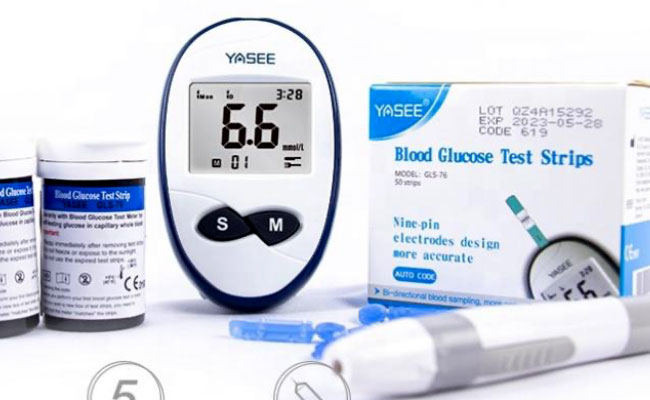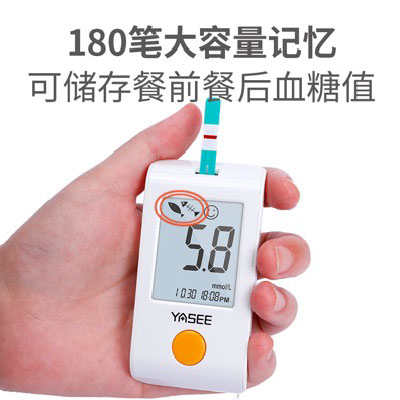
Who is Suitable for Home Oxygen Therapy?
2022-10-27
Can Soap Affect Blood Sugar Readings?
2022-11-02The fundamental reason why many patients with diabetes are prone to cardiovascular and cerebrovascular diseases such as cerebral infarction and myocardial infarction is that the blood sugar of patients cannot be controlled ideally for a long time and often fluctuates violently. The three indicators that can reflect whether the blood glucose is controlled to reach the standard mainly refer to fasting blood glucose, blood glucose in two hours after meal and glycosylated hemoglobin.
In rural areas, many patients have a bad problem that they cannot monitor blood glucose regularly. For example, some people only monitor fasting blood glucose, some people only monitor blood glucose two hours after meals, and some people even give up monitoring blood glucose directly. Therefore, these factors directly lead to patients with diabetes, increasing the risk of cardiovascular and cerebrovascular diseases such as cerebral infarction and myocardial infarction.
So, in the process of controlling blood glucose, whether fasting blood glucose is important or two hours after meal blood glucose is important, and what is the relationship between the two and glycosylated hemoglobin?
First of all, we should learn to accurately measure blood glucose. Fasting blood glucose requires that you should not eat any food at least 8 to 10 hours after dinner. The blood glucose measured the next morning is the most accurate.
The blood sugar measured two hours after a meal requires that the time should be measured at the beginning of the first meal. The blood sugar measured two hours later is accurate.
During this period, if the blood glucose measured one hour after supper or meal is eaten, the result is definitely inaccurate and biased.
Fasting blood glucose is called basal blood glucose, which means that if a patient’s fasting blood glucose is not well controlled, his blood glucose level will be high throughout the day. People with long-term high fasting blood glucose are more likely to have complications of diabetes.
The rise of blood sugar two hours after a meal is harmful to the human body mainly in the following two aspects: First, many people do not pay high attention to patients with elevated blood sugar two hours after a meal because their symptoms may be mild or they think they have eaten too much; Second, research shows that people with large fluctuations in blood glucose in the two hours after a long-term meal are more likely to have macrovascular diseases in diabetes, mainly coronary heart disease and cerebrovascular accidents.
Therefore, for a diabetes patient, both fasting blood glucose and postprandial blood glucose are very important, and they are required to be controlled within the acceptable range. There is a small point here, that is, for diabetes patients, if they want to control their blood sugar steadily all day, they must control their fasting blood sugar to reach the standard.
Finally, the study found that when glycosylated hemoglobin was 7.3%~8.4%, fasting blood glucose and postprandial blood glucose had the same effect on the overall blood glucose; When HbA1c is greater than 8.4%, the effect of fasting blood glucose on total blood glucose is greater than that of postprandial blood glucose; When glycosylated hemoglobin is less than 7.3%, the height of blood sugar mainly depends on the blood sugar after meal.
Therefore, this is one of the main reasons why clinicians ask us to monitor glycosylated hemoglobin frequently. Because different values of glycosylated hemoglobin have different influencing factors, and the doses of insulin and hypoglycemic drugs used are also different.
Finally, the study found that when glycosylated hemoglobin was 7.3%~8.4%, fasting blood glucose and postprandial blood glucose had the same effect on the overall blood glucose; When HbA1c is greater than 8.4%, the effect of fasting blood glucose on total blood glucose is greater than that of postprandial blood glucose; When glycosylated hemoglobin is less than 7.3%, the height of blood sugar mainly depends on the blood sugar after meal.
Therefore, this is one of the main reasons why clinicians ask us to monitor glycosylated hemoglobin frequently. Because different values of glycosylated hemoglobin have different influencing factors, and the doses of insulin and hypoglycemic drugs used are also different.





